We trust that by the time of publication, the Barbadian public would have received the official report on Barbados’ 2024 CXC results, with explanation of the delay. Even with that report provided, the concerns and questions articulated below still remain.
We are very disappointed that, as of 5th Sept, the Barbados public has yet to hear from the ministry of education re the national report and analysis of the 2024 CXC results, more than two weeks after their regional release by and report from CXC.
Guyana released their national report on 20th Aug, the same day that CXC released theirs. T&T the next day. Jamaica within a week, as well as announcing their national academic scholarship winners.
All these countries are much bigger, with the likely resultant concomitant complexities in reporting, compared to Barbados. The contrasting silence in Barbados is therefore disheartening.
It is also not fair nor reasonable to the students, eligible for Barbados Scholarships and Exhibitions, to be held in this two-week plus week-long anxious limbo of non-existent communication on, and confirmation of, their status – they also have matriculation and other deadlines, which may have already passed or are in jeopardy.
We are also anxious to hear analysis of Barbados’ national overall performance in the 2024 CXC CSEC and CAPE exams – not just the national academic scholarship awardees – particularly in view of the recent reports on the disturbing regional maths CSEC pass rate.
You Might Be Interested In
In any communication vacuum, fear, anxiety, disinformation and misinformation can fester. Lack of communication can be perceived as a lack of respect. It does not do justice to the hard work of teachers, students and parents, who all work together to optimise education outcomes.
The country is entitled to a timely report and analysis of these 2024 results, comparative with prior years. A public ten-year comparative analysis (national and per school) would also assist in understanding the role of the COVID era in education outcomes. This type of public reporting is the norm in many countries outside of CARICOM.
The Barbados ministry of education’s recent launch of the National Literacy Education Task Force, and its revelation of what appears to be systemic challenges in the public education of too many children, based on the annual pass-rate of children taking the BSSEE and the numbers of children leaving secondary school without any certification, or under-certified, result in a deeply troubling context within which to view the recent CXC information on the regional pass rates for CSEC maths – 36 per cent in 2024.
Let us review some of the publicly available national stats from Guyana, T&T and now Jamaica (the 3 largest CARICOM countries):
Jamaica:
‘…disclosure by education minister Fayval Williams that only 18 per cent of Jamaican students who sat the May-June CSEC exams received five or more subjects, inclusive of mathematics and English A (language)
‘….just 33 per cent of Jamaican candidates obtained passing grades in mathematics…’
Guyana:
‘…Mathematics…. also experienced a decrease, with its pass rate falling from 34 per cent last year to 31 per cent this year.’
T&T
‘…45.55 per cent …of the students who attempted five or more subjects inclusive of Mathematics and English A were successful compared to 51.53 per cent (7 290) in 2023. ‘
CARICOM:
‘….Only 4.9 per cent of Caribbean students – close to 120,000 annual candidates for the Caribbean Secondary Education Certificate exams – achieved passes in five or more subjects, including Mathematics and English…
…only 36 per cent of the total candidates passed the Mathematics CSEC exam, with pass rates fluctuating between 34 per cent and 43 per cent from 2021 to 2023.’
Further analysis reveals that the 2024 maths results may be only the tip of a long submerged iceberg, suggesting a damning indictment of the CARICOM education system at both a regional, and, in some cases, national level.
Are we failing the majority of our children?
Recent analysis by Hume Maths, a regional tutor , reveals ‘In 2003, 57 per cent of students passed Math across the region. In 2004, 54 per cent passed. In 2024 we are down to 36 per cent.’
2024 is not the first time the pass rate has been this low (36 per cent).
‘…. Based on CXC annual reports from 2004 to now is that the maths pass rate has dipped below 40 per cent on the following occasions within the last 20+ years:
2005 – 39 per cent
2006 – 35 per cent
2007 – 34 per cent
2009 – 39 per cent
2011 – 35 per cent
2012 – 34 per cent
2013 – 35 per cent
2022 – 37 per cent
2024 – 36 per cent
We are therefore clearly NOT in uncharted territory. This year’s figure is actually very familiar ground, which makes the long-term problem worse than it initially appears. The pass rate was 50 per cent or more on the following occasions:
2003 – 54 per cent
2004 – 57 per cent
2014 – 50 per cent
2015 – 57 per cent
2020 – 52 per cent (Multiple Choice and SBA)
Counting the years 2020 and 2023 when exams were marked without the Paper 02, the average pass rate over the time period 2003 to 2024 is 42.9 per cent Remove those two years, and the average is 42.5 per cent.
The full list is as follows:
2003 – 54 per cent
2004 – 57 per cent
2005 – 39 per cent
2006 – 35 per cent
2007 – 34 per cent
2008 – 41 per cent
2009 – 39 per cent
2010 – 41 per cent
2011 – 35 per cent
2012 – 34 per cent
2013 – 35 per cent
2014 – 50 per cent
2015 – 57 per cent
2016 – 44 per cent
2017 – 45 per cent
2018 – 49 per cent
2019 – 46 per cent
2020 – 52 per cent (Multiple Choice and SBA)
2021 – 41 per cent
2022 – 37 per cent
2023 – 43 per cent (Multiple Choice and SBA)
2024 – 36 per cent
(Data Collated by Hume Maths, regional CXC tutor service)
So clearly this challenge re poor overall testing outcomes pre-dates the COVID era, which would have made a bad state of play even worse.
It will be interesting to hear where Barbados fits into these performance figures.
When the Barbados national scholarship awards are eventually announced, we will celebrate those children who have worked hard and excelled academically, in the same way that we celebrate those who have achieved great success in sports, the creative and performing arts.
The academically gifted deserve such celebration, regardless of their background, and it is nothing that they need to apologise for (sometimes it seems that some would like them to). Some of us forget that education continues to lift many out of socio-economic challenges.
But let us not allow the celebration of these children to distract us from the education challenges affecting the majority of our nation’s children.
At the same time, we need to productively address the extent to which a majority of some children, in too many instances, are not testing well. Although there are often contributing factors affecting learning outside of the public education system, what more can our education system do to improve outcomes.
There must be some accountability, demanded by the CARICOM public, as to why these apparently annually perpetual low pass rate in maths, in particular, has been allowed to continue for so long by the authorities, without fundamental rectification and sounding the alarm bells to the public. The CARICOM and national education authorities would have had long-term data knowledge of this data.
We invest significant resources in education annually. Barbados may invest more per capita than most CARICOM members.
What return are we obtaining, what type of performance of our education system are we accepting, if thousands of children, if not the majority, are leaving school annually uncertified or under-certified?
And we wonder why crime levels are escalating.
Are the chickens coming home to roost?
Additionally, what is the feasible short and long-term plan to address at least this apparently national inability to ensure that the majority of students leave school with education basics: maths and English certification?
Do we really need a complicated education transformation plan to achieve that minimum?
We have identified myriad major apparently unaddressed challenges in CXC’s exam administration which have manifested annually, at an increasing scale: quality assurance in exam setting and grading, stakeholder engagement and communication, accountability and transparency, governance and need for external expert independent regulation.
It is becoming clearer, over these five years of national and regional advocacy, that the challenges in national education extend beyond CXC – the primary and secondary learning and teaching environment, the CARICOM ‘education ecosystem’, is desperately in need of long overdue overhaul.
In the meantime, how long will we allow, how many of our innocent children will pay the price?
Paula-Anne Moore
Parent and student advocate
Spokesperson & Coordinator
Group of Concerned Parents of Barbados
Caribbean Coalition for Exam Redress

Paula-Anne Moore
Paula-Anne Moore is spokesperson/coordinator of the Group of Concerned Parents, Barbados.
Disclaimer: The views and opinions expressed by the author(s) do not represent the official position of Barbados TODAY.

 3 months ago
36
3 months ago
36

 English (US) ·
English (US) ·